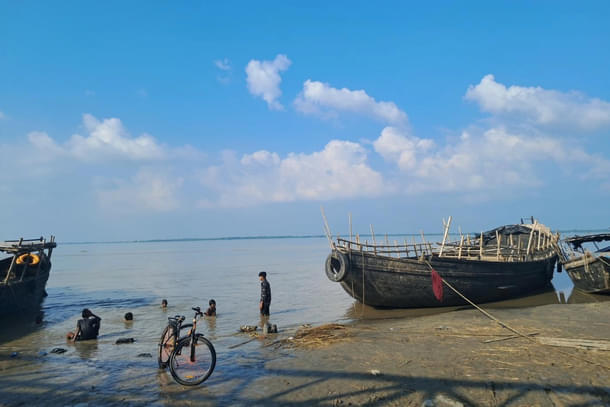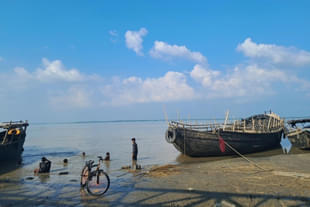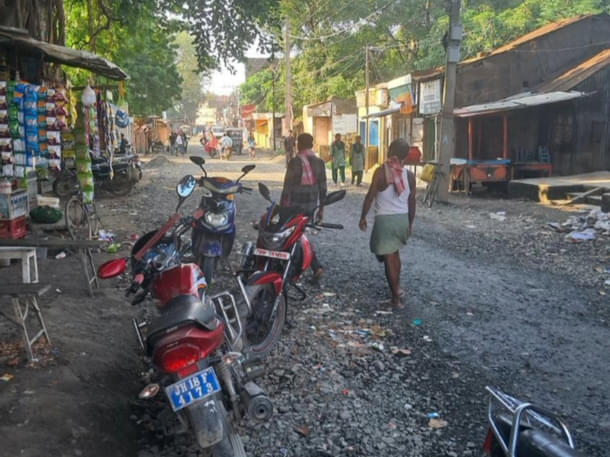Politics
Journey Through Jharkhand, Dispatch 6: Ganga's Forgotten Shores, Broken Promises, And Broken Roads
Banuchandar Nagarajan
Oct 20, 2024, 10:16 AM | Updated Nov 08, 2024, 05:04 PM IST
Save & read from anywhere!
Bookmark stories for easy access on any device or the Swarajya app.


Rajmahal, Sahibganj District
The Ganga River takes a southward turn at Sahibganj. From Pakur district, I decided to make a detour into Murshidabad, West Bengal, to visit the Farakka Barrage. However, our journey was delayed due to a Bharatiya Janata Party-led protest over the R G Kar issue.
The return to Jharkhand's Sahibganj district was an arduous task. The state of the roads in Murshidabad was shocking — completely disastrous. The narrow stretch in Murshidabad, separating Jharkhand from Bangladesh, is infamous as a hotspot for illegal immigration.
The predominantly Muslim villages along the border between West Bengal and Jharkhand are gripped by heart-wrenching poverty. My driver, originally from Rajasthan, was visibly moved by the scale of destitution in the area, stating, "Maine itni garibi nahi dekhi, sir (I haven’t witnessed such poverty, sir)."
This continuum of poverty continues undiminished from Pakur to Sahibganj. Passing through predominantly Muslim communities, it took over an hour to cover a mere 30 kilometres (km) due to the poor road conditions.

Upon reaching the district headquarters of Rajmahal, which also serves as the name of the parliamentary constituency, I was struck by the squalor. The town is riddled with filth, lacking decent roads, and with open sewage prevalent throughout the area. The situation in Rajmahal is reminiscent of a town that is at least three decades behind most of India.
In conversation with a local resident, Bimal Burman, I enquired about the state of affairs in the town. His response was curt and filled with frustration, as he remarked that the town would always remain like this. He dismissed any talk of "Vikas (development)" as a waste of time. "Just look around," he said. "Is there any hope here?" His despair was palpable — indeed tragic.
Despite being located on the banks of the Ganga, Rajmahal lacks access to piped water, and the electricity supply is woefully inadequate. The local Member of Parliament, Vijay Kumar Hansdak, has served three consecutive terms and had once vowed — swearing on the Ganga — that he would improve the infrastructure and ensure the construction of a bridge over the river.
However, Bimal, like many others, is disillusioned and expressed his anger towards the MP.
The Bengali community here traditionally supports the BJP, and their Member of the Legislative Assembly (MLA), Anant Kumar Ojha, is a two-time representative of the party. Ojha, who formerly served as the president of Bharatiya Janata Yuva Morcha (BJYM) Jharkhand, too, cannot escape answers for the state of destitution.
It was the rainy season, and the Ganga was flowing full and relatively unpolluted. As we travelled further, we passed through several small tribal villages before entering Godda.
Lalmatia, Godda District
As I sipped tea in a small shop, a well-built man with a gruff demeanour stopped by, introducing himself as "M D Sheik." It took me a while to realise he meant Mohammed Sheik. He spoke with an attitude, hardly making any eye contact.
I enquired about his work, to which he casually mentioned that he was involved in the coal business, specifically in sourcing equipment and manpower. Gunda alert! His demeanour exuded an air of authority, and it was clear he was a local strongman, adept at getting things done in this unorganised business. I dared not to ask whether he is from the land across the Ganga.
On my way to the village, I noticed an open coalfield. Sheik confirmed that he had a contract for that as well. When I asked how a private coalfield was operating on tribal land, he replied with a dismissive, "Sarkar kuch bhi kar sakti hai (The government can do anything)." The legalities surrounding the issue were still unclear to me, but I knew it had been a major concern during the time of the Raghubar Das government.
Our conversation turned to the topic of land ownership, and I asked Sheik about the previous government's proposal to allow Scheduled Tribes to sell their land for development purposes. He strongly opposed the idea, stating that it would rob the tribal people of their property.
When I raised the point that such sales might generate jobs, he countered with a stark remark: "Jobs last only as long as a person lives. What happens after that?" I had to admit, that was deep.
Sheik was unequivocal in his belief that Muslims and tribals must unite to prevent outsiders from taking their land. As he departed without a formal farewell, I was left pondering how he had become an "insider."
There is a prevailing belief in these parts that the Muslims, with the tacit support of the government, are manipulating the tribals by portraying Other Backward Classes (OBC) Hindus as the bogeymen.
The local MLA, Dipika Pandey Singh (quite a last name!) of the Congress, hails from a prominent political family and is married into another. Given the current political dynamics, it is likely that she will win again, with the support of both the tribal and Muslim communities. Identity politics once again prevails over development as the region remains deprived of basic necessities.
However, on the parliamentary front, Godda's constituency is represented by the formidable Nishikant Dubey of the BJP, who has won the seat four times consecutively. Dubey manages to keep his baiters in Lutyens engaged and employed.
In the end, only a "double-engine sarkar" might bring some relief to these profoundly backward areas. The legacy of Raghubar Das’ policies looms large, and future governments must tread carefully when dealing with tribal issues.
True progress will be slow in coming to this region. Such is the unfortunate price of democracy. The opportunity cost of underdevelopment in these mineral-rich areas is significant — not just for the tribal communities but for the country as a whole.
This situation offers a stark contrast to the relative success seen in southern Jharkhand, Odisha, and Chhattisgarh.
The "poverty amidst plenty" is the familiar paradox of Jharkhand. The state cries out for a statesman-administrator who could build consensus and pull society in the right direction. The high cost of underdevelopment in this corner of India is not just socially ruinous but morally untenable.
Earlier dispatches in this 'Journey Through Jharkhand' series:
1: A Primer On History, Politics, And People
2: Clear Split In Voting Preferences Between Tribals And OBCs In Southwest Jharkhand
3: Urban Jharkhand Yearns For Progress
4: How Life Goes On In The Santhal Parganas
5: Pakur Is Caught In A Time Warp, Struggling With Even Basic Amenities
Banuchandar is a political and public policy advisor. He posts at @Banu4Bharat.





